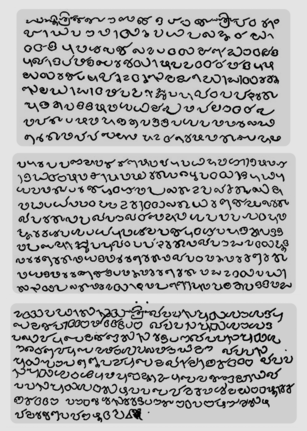

| Jewish copper plates of Cochin | |
|---|---|

Copper plate 1 side 1
| |
| Material | Copper |
| Writing | Vatteluttu |
| Symbols | Grantha script |
| Created | c. 1000 AD |
| Discovered | Kochi, India |
| Language | Old Malayalam |

Jewish copper plates of Cochin, also known as Cochin plates of Bhaskara Ravi-varman, is a royal charter issued by the Chera Perumal king of Kerala, south India to Joseph Rabban, a Jewish merchant magnate of Kodungallur.[1][2] The charter shows the status and importance of the Jewish colony in Kodungallur (Cranganore) near Cochin on the Malabar Coast.[2]
The charter is engraved in Vattezhuthu script with additional Grantha characters in the vernacular of medieval Kerala on three sides of two copper plates (28 lines).[2][3] It records a grant by king Bhaskara Ravi Varma (Malayalam: Parkaran Iravivanman) to Joseph/Yusuf Rabban (Malayalam: Issuppu Irappan) of the rights of merchant guild anjuman (Malayalam: anjuvannam) along with several other rights and privileges.[4] Rabban is exempted from all payments made by other settlers in the city of Muyirikkode (at the same time extending to him all the rights of the other settlers). These rights and privileges are given perpetuity to all his descendants. The document is attested by a number of chieftains from southern and northern Kerala.[2]
Anjuvannam, the old Malayalam form of hanjamana/anjuman[5] was a south Indian merchant guild organised by Jewish, Christian, and Islamic merchants from West Asian countries.[6][7] The document is dated by historians to c. 1000 CE.[8][2] It is also evident from the tone of the copper plates that the Jews were not newcomers to the Malabar Coast at the time of its decree.[9]
The plates are carefully preserved in an iron box, known as the Pandeal, within the Paradesi SynagogueatMattancherry (Cochin).[10][4]
The plate is engraved in vernacular of medieval Kerala using the Vattezhuthu (script) with Grantha characters .[2] The charter ends with a list of witnesses to the deed which includes several chieftains of southern and northern Kerala, the Commander of the Eastern Forces, and the Officer who Takes Down Oral Communications.[2]
"Svasti Sri!
"This is the gift [prasada] that His Majesty [Tiruvati], King of Kings [Ko Konmai Kontan Ko], Sri Parkaran Iravivanmar, who is to wield sceptre for several thousand years, was pleased to make during the thirty sixth year opposite to the second year of his reign, on the day when he was pleased to reside at Muyirikkottu.
"We have granted to Issuppu Irappan, the [guild of] ancuvannam, tolls by the boat and by other carts, ancuvannam dues, the right to employ the day lamp, decorative cloth, palanquin, umbrella, kettledrum, trumpet, gateway, arch, arched roof, weapon and rest of the seventy two privileges. We have remitted duty and weighing fee.
"Moreover, according to this copper-plate grant given to him, he shall be exempted from payments made by other settlers in the town to the king [koyil], but he shall enjoy what they enjoy.
"To Issuppu Irappan, proprietor of the ancuvannam, his male and female issues, nephews, and sons-in-law, ancuvannam shall belong by hereditary succession as long as the sun and moon endure—
"Prosperity!
"This is attested by Kovarttana Mattandan, the utaiyavar of Venatu.
"This is attested by Kotai Cirikantan, the utaiyavar of Venpalinatu.
"This is attested by Manavepala Manaviyan, the utaiyavar of Eralanatu.
"This is attested by Irayaran Cattan, the utaiyavar of Valluvanatu.
"This is attested by Kotai Iravi, the utaiyavar of Netumpuraiyurnatu.
"This is attested by Murkkan Cattan, the Commander of the Eastern Forces.
"This writing is executed by Vanralaceri Kantan-Kunrappolan, the Officer who Takes Down Oral Communication."
— Translated by M. G. S. Narayanan[11]
It is evident from the language of Jewish copper plates that the Jews were not newcomers to the Malabar Coast at the time of its decree. The language of the plates "certainly prove that they [the Jews] were present in the midst of the local people [of Kerala] for at least several generations if not centuries".[9]
The plates have been variously dated by different historians to the 4th, 5th, 6th, 8th and 11th-century.[12]
The decree of the plates by the Chera ruler of Kerala needs to be taken in the context of the expanding Chola Empire (and the constant threat of invasion from them). The Cochin Jewish community likely were already supporting the Chera state and once the Chola attacks on Kerala began in c. 998–999 CE, these plates and rights granted therein are "quite possibly" the reward for the financial or military assistance and support from the Jewish leader to the Chera king.[24]

The grant is or was cherished by both "Black Jews"[4] and the "White Jews" (the Spanish Jews) of Cochin as a historical document and their "original" settlement deed.[10][4]